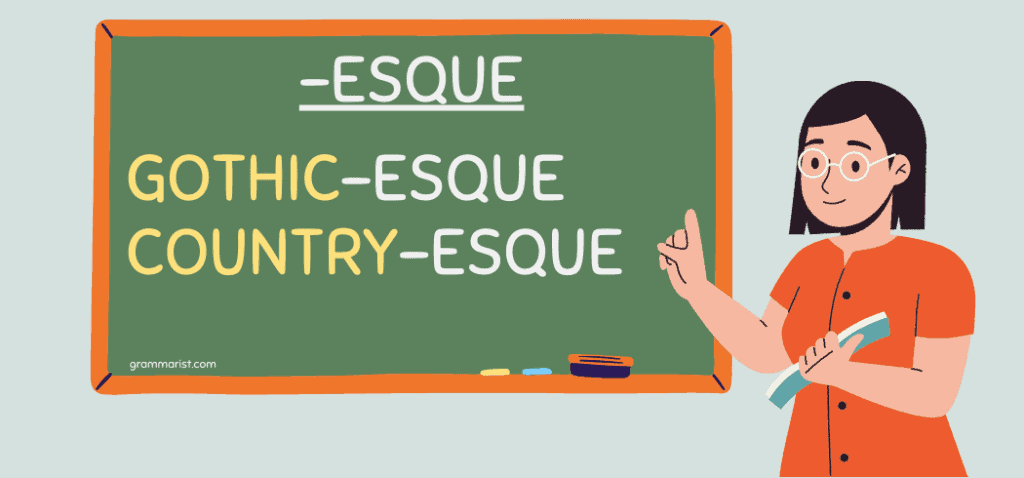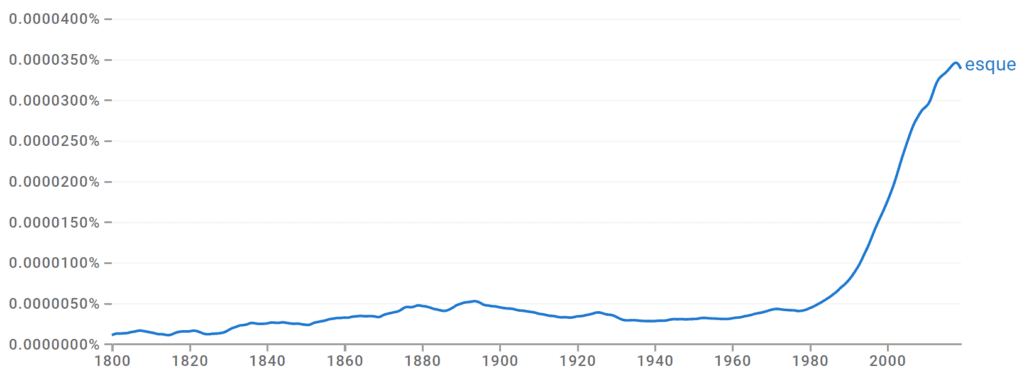The English language is a dynamic, ever-evolving soup of words. One of its most interesting elements is the ability to alter the meaning of a word by simply adding a prefix or suffix. So, I’m taking a much closer look at the suffix -esque, which has the power to transform a noun into an adjective. Buckle up because we’re going on a wordy adventure!
Meaning of -esque as a Suffix

When you add -esque to the end of a word, you’re adding the meaning of in the style or manner of or resembling. The -esque suffix can transform a regular noun into an adjective describing something similar to or characteristic of the noun. It’s a way to show exaggerated imitation.
Let me simplify. You could say a new fantasy book is similar to Lord of the Rings, or you could say it’s very Tolkien-esque. Both statements imply the same idea, but by using the English suffix to modify the word Tolkien (the author), you’re suggesting that this new book in question has a lot of the same vibes and style as the books written by J.R.R. Tolkien.
How to Use the “-esque” Suffix
Generally, -esque is meant to be added to a noun to create an adjective of sorts. The resulting word implies that the object or person described has qualities or features reminiscent of the original noun. It’s a handy tool for creating descriptive, evocative language.
Also, the traditional guideline is to use a hyphen before esque when adding this suffix to words. But there are some sources that claim it’s acceptable to use without.
Can You Add “-esque” to Any Word?
The English language is certainly a playground, and while there are no hard rules against adding -esque to any word, not every construction will make sense to your listener or reader.
The suffix is most commonly attached to proper nouns, especially names of people and places, as well as to words referring to artistic styles and periods.
- Great example: My home décor style is very country-esque.
- Not so-great example: This new fridge is very fridge-esque.
Etymology of the “-esque” Suffix

The -esque suffix is rooted in the Old French -esque and was borrowed into English via French. The Old French -esque came from the Italian -esco, which was, in turn, derived from the Latin -iscus, meaning pertaining to. The suffix has been in use for centuries, going back as far as the beginning of the 1800s.
Different “-esque” Words to Consider
So, like anything, there are always exceptions. But, in this case, there’s a reason! Words like burlesque and grotesque end in -esque, but it’s not a suffix. Terms like these are borrowed directly from other languages, like Italian, where -esco or -esca is a more integral part of the word, not just a suffix.
Esque vs. -ish vs. -like
While -esque is a useful suffix for adding an artistic or stylistic resemblance to a word, it’s not the only tool in the English language for this purpose. Two other suffixes, -ish and -like, perform similar functions but with slightly different connotations.
The suffix -esque suggests a strong or distinctive resemblance, often used when the resemblance is artistic, stylistic or thematic.
- That new TV show is very Lovecraft-esque, which makes sense since it’s based on his writings.
The suffix -ish is used to indicate something sort of, but not exactly like something else. It implies a lesser degree of similarity, like how the word childish means somewhat like a child, but not exactly.
Then we have -like that suggests a more general resemblance and can be used with a wider range of words. Childlike, unlike childish, has a more positive connotation and just means resembling a child.
Using “-esque” in a Sentence

Let’s take a look at how -esque can be used in some sentences.
- The new painting Maerril bought for our home was almost Monet-esque in its beautiful, blurry landscape representation.
- The new guy’s sense of humor was Seinfeld-esque, full of wry observations about everyday life, so I knew we’d hit it off.
- Candace admired the Gothic-esque architecture of the old building and immediately knew she had to write it into her next story.
Grammar-esque
So, the next time you want to express a certain style or similarity, consider the –esque suffix. Its powerful transformation capabilities allow you to create an evocative language that paints a vivid picture. So go forth and add some -esque flair to your everyday language. After all, it’s quite Shakespeare-esque!
